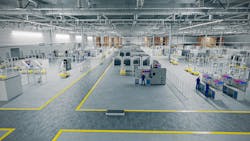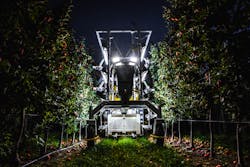This Week in Power & Motion: ABB Invests in European Robotics Hub
There is much going on in the world of hydraulics, pneumatics and electronics motion systems, from technology introductions and industry advancements to new trends and industry leaders. Each week the Power & Motion team collects some of the latest industry news to help keep our readers up to date on what's happening in the fluid power and electronic motion control sectors as well as the industries they serve.
Helios Technologies Introduces Remote Support Capabilities
Helios Technologies has integrated i3 Product Development's Cygnus Remote Support Platform – which it gained through its recent acquisition of i3 — into its OpenPV software platform, a software development tool for the company's OpenView displays.
Integration of the Cygnus platform enables application engineers to easily integrate customer support capabilities into the display software. This will allow for remote connectivity, diagnosis and troubleshooting as well as real-time assistance using a phone and camera.
The Cygnus platform provides technicians the ability to help customers using video streaming and screen sharing features, as well as access equipment software to be able to remotely service the product real time in the field stated Helios in its press release announcing the capability. This will help technicians speed up their ability to help customers with any maintenance issues related to a machine or its components, leading to reduced downtime and improved productivity for all involved.
CNH Invests in Robotic Harvesting Start Up
CNH Industrial has made a minority investment in Advanced Farm Technologies, a California-based start up specializing in the development of robotic harvesting of apples, strawberries and other fruits. The companies will collaborate on R&D and commercialization projects to help bring advanced harvesting technologies to the agricultural market – helping farmers improve their productivity and overcome labor challenges.
Advanced Farm Technologies' solution utilizes computer vision and machine learning to help machines pick the best fruit during harvest. It enables use day or night, helping to extend work hours for farmers when necessary.
The company's system features robotic arms with gentle grippers to prevent damaging delicate crops. Additional features include a serial-hybrid drive system, autonomous navigation and automated bin handling.
According to CNH, the investment is a part of its technology growth efforts and strategy to bring high-tech solutions to the agricultural market. Most recently the company acquired Hemisphere GNSS, a developer of high-performance satellite positioning technology, to aid with these efforts.
READ MORE: Rapid Growth Ahead for Mobile Robot Components Market
Oshkosh Partners with Manufacture 2030 for Supply Chain Sustainability
Oshkosh Corp. has formed a partnership with Manufacture 2030 to improve the sustainability of its supply chain, aiding with its efforts to reduce its carbon footprint. Through its software and support services, Manufacture 2030 provides companies like Oshkosh and their suppliers with data, tools and support to meet greenhouse gas (GHG) emissions reduction targets.
To start, Oshkosh will offer Manufacture 2030's software platform to its top 300 suppliers which represent about 75% of the OEM's total supply chain emissions. Use of the software will help suppliers better identify the necessary actions to take to measure, manage and reduce carbon emissions while also trimming their operational costs.
"At Oshkosh, sustainability is integrated into everything we do," said Kevin Tubbs, vice president, chief ethics, compliance and sustainability officer, Oshkosh Corporation, in the company's press release announcing the partnership. "Our partnership with Manufacture 2030 will help our suppliers create carbon action plans to drive sustainable growth. Manufacture 2030 is a key program for Oshkosh to help us measure and reduce our supply chain emissions effectively and to make progress towards achieving our sustainability goals."
Like many manufacturers today, Oshkosh is working to reduce its environmental footprint through improvements in its production and supply chain, as well as development of low- and zero-emission vehicles such as the next-generation delivery vehicle it is providing the U.S. Postal Service and its recently introduced zero-emission electric refuse collection vehicle.
READ MORE: Manufacturers Increase Sustainability Initiatives
ABB Investing in European Robotics Hub
ABB is investing $280 million to expand its manufacturing space in Europe and build a new state-of-the-art robotics center. The ABB Robotics European Campus in Västerås, Sweden, will serve as the company's hub for its ABB Robotics offering in Europe.
The new facility will replace the existing robotics facilities at the site, and has a planned opening for late 2026. Creation of the robotics hub is part of the company's "local for local" production strategy. Efforts like this to manufacture products for customers in a region close to a facility have increased in recent years as companies aim to improve supply chains and reduce their carbon footprint.
ABB anticipates the new facility will expand production capacity by 50% and strengthen its ability to serve the European market which it states is anticipated to grow 7% through 2027. The new robotics campus will enable close collaboration with customers and industry partners to develop robotic solutions which meet market needs.
"This is a great time to invest in robotics and automation. This new campus is a significant part of our global growth story and key in supporting our European customers as they accelerate investment in robotics and AI due to the reshoring of industry, the move to more sustainable supply chains and long-term labor shortages," said Sami Atiya, President of ABB’s Robotics & Discrete Automation Business Area, in the company's press release announcing the investment. "Our Robotics Campus will help us to serve our customers more efficiently and support new and existing sectors like automotive, electronics, logistics, healthcare, e-commerce and pharmaceuticals to unlock the full potential of automation."
About the Author
Sara Jensen
Executive Editor, Power & Motion
Sara Jensen is executive editor of Power & Motion, directing expanded coverage into the modern fluid power space, as well as mechatronic and smart technologies. She has over 15 years of publishing experience. Prior to Power & Motion she spent 11 years with a trade publication for engineers of heavy-duty equipment, the last 3 of which were as the editor and brand lead. Over the course of her time in the B2B industry, Sara has gained an extensive knowledge of various heavy-duty equipment industries — including construction, agriculture, mining and on-road trucks —along with the systems and market trends which impact them such as fluid power and electronic motion control technologies.
You can follow Sara and Power & Motion via the following social media handles:
X (formerly Twitter): @TechnlgyEditor and @PowerMotionTech
LinkedIn: @SaraJensen and @Power&Motion
Facebook: @PowerMotionTech

Leaders relevant to this article:


